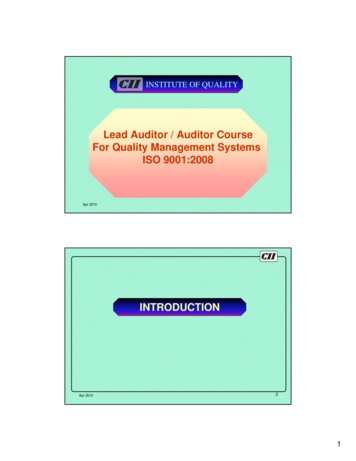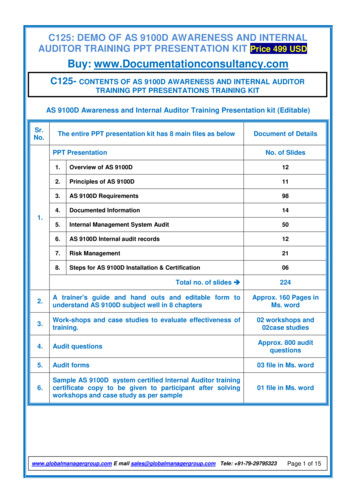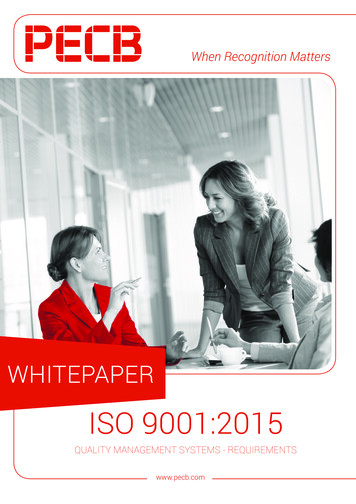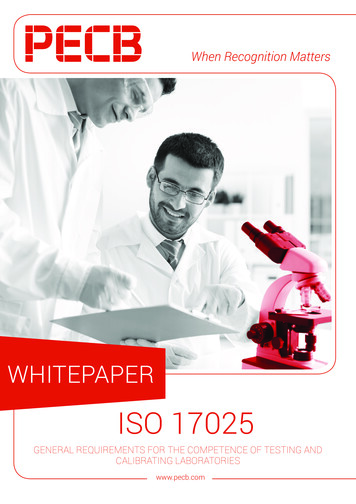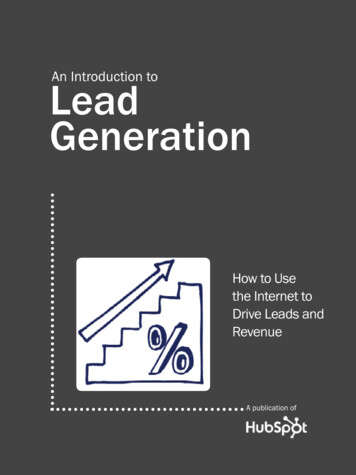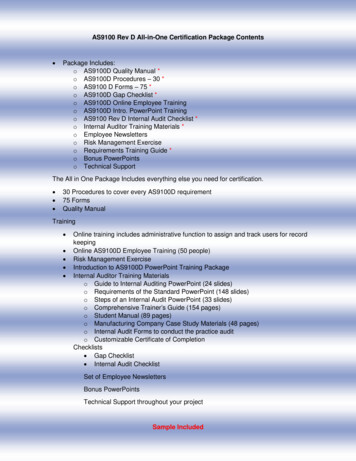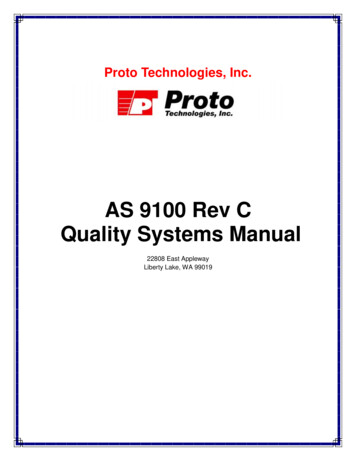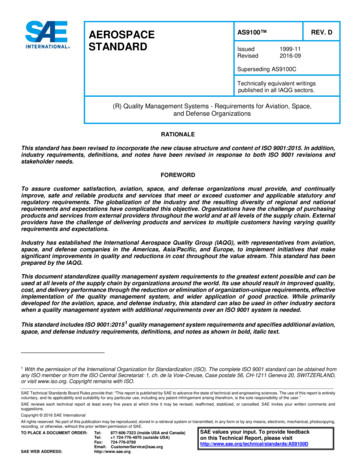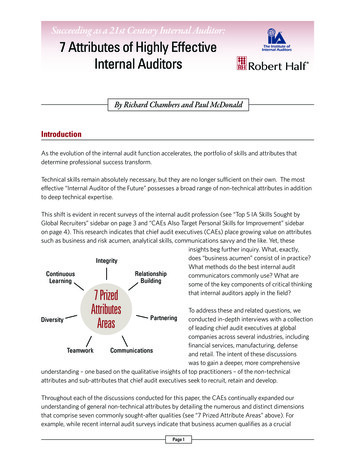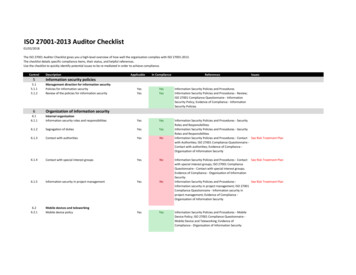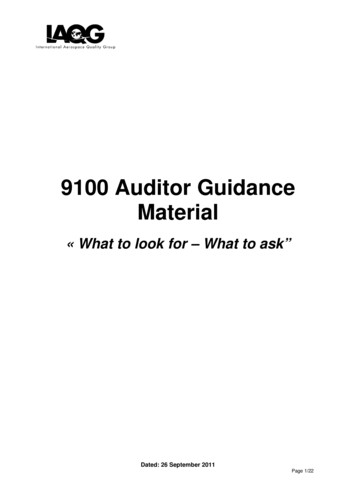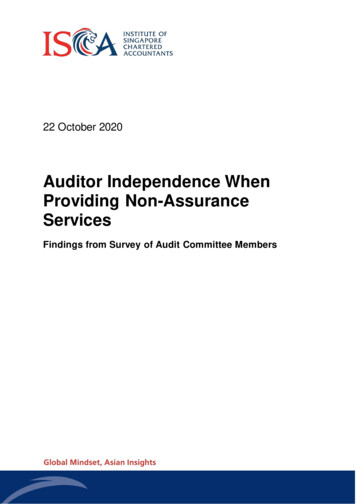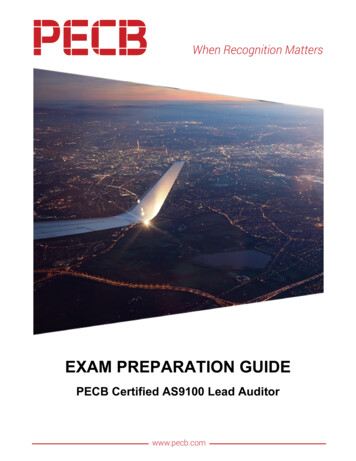
Transcription
When Recognition MattersEXAM PREPARATION GUIDEPECB Certified AS9100 Lead Auditorwww.pecb.com
PECB-820-5- AS9100 LA Exam Preparation GuideThe objective of the “PECB Certified AS9100 Lead Auditor” exam is to ensure that thecandidate possesses has mastered the audit concepts and techniques and is able to participatein aerospace quality management system audits based on AS9100 standard.The AS9100 Lead Auditor exam is intended for: Auditors seeking to perform and lead Aerospace Quality Management System (AQMS)certification auditsManagers or consultants seeking to master an Aerospace Quality Management Systemaudit processIndividuals responsible for maintaining conformance with the AQMS requirementsTechnical experts seeking to prepare for an Aerospace Quality Management SystemauditExpert advisors in Aerospace Quality ManagementThe exam content covers the following competency domains: Domain 1: Fundamental principles and concepts of an Aerospace Quality ManagementSystem (AQMS)Domain 2: Aerospace Quality Management System (AQMS)Domain 3: Fundamental audit concepts and principlesDomain 4: Preparation for an AS9100 auditDomain 5: Conducting an AS9100 auditDomain 6: Closing an AS9100 auditDomain 7: Managing an AS9100 audit programPage 2 of 15
PECB-820-5- AS9100 LA Exam Preparation GuideThe content of the exam is divided as follows:Domain 1: Fundamental principles and concepts of an AerospaceQuality Management System (AQMS)Main objective: Ensure that the AS9100 Lead Auditor candidate can understand, interpret andillustrate the main quality management concepts related to an Aerospace Quality ManagementSystem (AQMS).CompetenciesKnowledge statements1. Ability to understand and explain the AS9100and the development of Aerospace QualityManagement standards.2. Ability to identify, analyze and evaluate theQualityManagementcompliancerequirements for an organization.3. AbilitytounderstandtheQualityManagement methods and techniques.4. Ability to explain and illustrate the mainconcepts in Quality Management.1. Knowledge of the application of ISO managementprinciples in Quality Management.2. Knowledge of the main standards in QualityManagement.3. Knowledge of the main advantages of an AS9100certification for an organization.4. Knowledge of Quality Circles, Total QualityManagement, Six Sigma, Lean, Kaizen, Just-inTime, etc.5. Knowledge of the main Quality Managementconcepts and terminology as described in ISO9000.6. Knowledge of the concepts of process approachand risk-based thinking in Quality Management.Page 3 of 15
PECB-820-5- AS9100 LA Exam Preparation GuideDomain 2: Aerospace Quality Management System (AQMS)Main objective: Ensure that the AS9100 Lead Auditor candidate can understand, interpret andillustrate the main concepts and components of an Aerospace Quality Management Systembased on the AS9100.CompetenciesKnowledge statements1. Ability to identify, understand, classify andexplain the clauses with requirements fromAS9100.2. Ability to understand and explain thecomponents of an Aerospace QualityManagement System based on the AS9100and its principal processes.3. Ability to interpret and analyze therequirements of AS9100.4. Ability to understand, explain and illustratethe main steps to establish, implement,operate, monitor, review, maintain andimprove an organization’s AQMS.5. Ability to understand and explain the conceptof continual improvement application to anAQMS1. Knowledge of the concepts, principles andterminology related to management systemsand the "Plan-Do-Check-Act" (PDCA) model.2. Knowledge of the principal characteristics of anintegrated management system.3. Knowledge of the AS9100 requirementspresented in clauses 4 to 10.4. Knowledge of the main steps to establish theAQMS policies, objectives, processes andprocedures relevant to managing risk andimproving Aerospace Quality Management todeliver results in accordance with anorganization’s overall policies and objectives(awareness level).5. Knowledge of the concept of continualimprovement and its application to an AQMS.Page 4 of 15
PECB-820-5- AS9100 LA Exam Preparation GuideDomain 3: Fundamental audit concepts and principlesMain objective: Ensure that the AS9100 Lead Auditor candidate can understand, interpret andapply the main concepts and principles related to an AQMS audit in the context of AS9100.CompetenciesKnowledge statements1. Ability to understand, explain and illustratethe application of the audit principles in thecontext of an AS9100 audit.2. Ability to identify and judge situations thatwould discredit the professionalism of theauditor and the PECB Code of Ethics.3. Ability to identify and evaluate ethicalproblems taking into account the obligationsrelated to the audit client, auditee, and lawenforcement and regulatory authorities.4. Ability to explain, illustrate and apply the auditevidence approach in the context of anAS9100 audit.5. Ability to explain and compare the types andcharacteristics of evidence.6. Ability to determine and justify what type ofevidence and how much evidence will berequired in the context of a specific AQMSaudit mission.7. Ability to determine and evaluate the level ofmateriality and apply the risk based approachduring the different phases of an AS9100audit.8. Ability to judge the appropriate level ofreasonable assurance needed for a specificAS9100 audit mission.1. Knowledge of the main audit concepts andterminology as described in the AS9100.2. Knowledge of the main requirements for bodiesproviding audit and certification of managementsystems based on ISO/IEC 17021-1.3. Knowledge of the differences between first party,second party and third party audits.4. Knowledge of the following audit principles:integrity, fair presentation, due professional care,professional judgment, professional skepticism,confidentiality and independence.5. Knowledge of the professional responsibility ofan auditor and the PECB Code of Ethics.6. Knowledge of evidence based approach in anaudit.7. Knowledge of the different types of evidences:physical, mathematical, confirmative, technical,analytical, documentary and verbal.8. Knowledge of the quality of audit evidences(competent, appropriate, reliable and sufficient)and the factors that will influence them.9. Knowledge of the risk-based approach in anaudit and the different types of risks related toaudit activities.10. Knowledge of the concept of materiality and itsapplication in an audit.11. Knowledge of the concept of reasonableassurance and its applicability in an audit.Page 5 of 15
PECB-820-5- AS9100 LA Exam Preparation GuideDomain 4: Preparation for an AS9100 auditMain objective: Ensure that the AS9100 Lead Auditor candidate can appropriately prepare anAQMS audit in the context of AS9100.CompetenciesKnowledge statements1. Ability to understand and explain the stepsand activities to prepare an AQMS audittaking into consideration the specific contextand conditions of the audit mission.2. Ability to understand and explain the rolesand responsibilities of the audit team leader,audit team members and technical experts.3. Ability to determine, evaluate and confirm theaudit objectives, the audit criteria and theaudit scope for a specific AS9100 auditmission.4. Ability to conduct a feasibility study of anaudit in the context of a specific AS9100 auditmission.5. Ability to explain, illustrate and define thecharacteristics of the audit terms ofengagement and apply the best practices toestablish a first contact with an auditee in thecontext of a specific AS9100 audit mission.6. Ability to develop audit working papers andelaborate appropriate audit test plans in thecontext of a specific AS9100 audit mission.1. Knowledge of the main responsibilities of theaudit team leader and audit team members.2. Knowledge of the roles and responsibilities oftechnical experts in an audit.3. Knowledge of the definition of audit objectives,audit scope and audit criteria.4. Knowledge of the difference between theAQMS scope and the audit scope.5. Knowledge of the elements to review during thefeasibility study of an audit.6. Knowledge of the cultural aspects to consider inan audit.7. Knowledge of the characteristics of audit termsof engagement and the best practices toestablish a first contact with an auditee.8. Knowledge of the preparation of an audit plan.9. Knowledge of determining the time the auditshould last by the number of employees forauditing AS910010. Knowledge of the preparation and developmentof audit working papers.11. Knowledgeoftheadvantagesanddisadvantages of using audit checklists.12. Knowledge of the best practices for the creationof audit test plans.Page 6 of 15
PECB-820-5- AS9100 LA Exam Preparation GuideDomain 5: Conducting an AS9100 auditMain objective: Ensure that the AS9100 Lead Auditor candidate can efficiently conduct anAQMS audit in the context of AS9100.CompetenciesKnowledge statements1. Ability to organize and conduct the openingmeeting in the context of a specific AS9100audit mission.2. Ability to conduct a stage 1 audit in thecontext of a specific AS9100 audit missionand taking into account the documentationreview conditions and criteria.3. Ability to conduct a stage 2 audit in thecontext of a specific AS9100 audit mission byapplying the best practices of communicationto collect the appropriate evidence and takinginto account the roles and responsibilities ofall people involved.4. Ability to explain, illustrate and apply statisticaltechniques and main audit sampling methods.5. Ability to objectively gather appropriateevidence from the available information duringan audit and evaluate it objectively.6. Ability of preparing, opening, conducting andclosing an Interview.1. Knowledge of the objectives and the content ofthe opening meeting of an audit.2. Knowledge of the difference between stage 1audit and stage 2 audit.3. Knowledge of stage 1 audit requirements, stepsand activities.4. Knowledge of the documentation review criteria.5. Knowledge of the documentation requirementsstated in AS9100.6. Knowledge of stage 2 audit requirements, stepsand activities.7. Knowledgeofthebestpracticesofcommunication during an audit.8. Knowledge of the roles and responsibilities ofguides and observers during an audit.9. Knowledge of the conflict resolution techniques.10. Knowledge of evidence collection procedures:observation, documentation review, interviews,analysis and technical verification.11. Knowledge of evidence analysis procedures:corroboration and evaluation.12. Knowledge of the main concepts, principles andstatistical techniques used in an audit.13. Knowledge of the main audit sampling methodsand their characteristics.14. Knowledge of preparing interview questions,checklist, closing an interview and evaluation ofthe intervention.Page 7 of 15
PECB-820-5- AS9100 LA Exam Preparation GuideDomain 6: Closing an AS9100 auditMain objective: Ensure that the AS9100 Lead Auditor candidate can conclude an AQMS auditand conduct follow-up activities in the context of AS9100.CompetenciesKnowledge statements1. Ability to explain and apply the evaluationprocess of evidences to draft audit findingsand prepare audit conclusions.2. Ability to understand, explain and illustratethe different levels of conformity and theconcept of the benefit of the doubt.3. Abilitytoreportappropriateauditobservations in order to help an organizationimprove an AQMS with respect to audit rulesand principles.4. Ability to complete audit working documentsand conduct a quality review of an AS9100audit.5. Ability to draft audit conclusions and presentthese to the management of the auditedorganization.6. Ability to organize and conduct an auditclosing meeting.7. Ability to write an AS9100 audit report andjustify a certification recommendation.8. Ability to conduct the activities following aninitial audit including the evaluation of actionplans, follow-up audits, surveillance auditsand recertification audits.1. Knowledge of the evaluation process ofevidences to draft audit findings and prepareaudit conclusions.2. Knowledge of the differences and thecharacteristics between the concepts , anomaly and observation.3. Knowledge of the guidelines and best practicesto write nonconformity reports.4. Knowledge of the guidelines and best practicesto draft and report audit observations.5. Knowledge of the principle of the benefit of thedoubt and its application in the context of anaudit.6. Knowledge of the guidelines and best practicesto complete audit working documents andperform a quality review of an audit.7. Knowledge of the guidelines and best practicesto present audit findings and conclusions to themanagement of an audited organization.8. Knowledge of the possible recommendationsthat an auditor can issue in the context of acertification audit and the certification decisionprocess.9. Knowledge of the guidelines and best practicesto evaluate action plans.10. Knowledge of follow-up audits, surveillanceaudits and recertification audit requirements,steps and activities.11. Knowledge of the conditions for modification,extension, suspension or withdrawal of acertification for an organization.Page 8 of 15
PECB-820-5- AS9100 LA Exam Preparation GuideDomain 7: Managing an AS9100 audit programMain objective: Ensure that the AS9100 Lead Auditor understands how to establish andmanage an AQMS audit program.CompetenciesKnowledge statements1. Ability to understand and explain theestablishment of an audit program and theapplication of the PDCA model.2. Ability to understand and explain theimplementation of an AS9100 audit program(first party, second party and third party).3. Ability to understand and explain theresponsibilities to protect the integrity,availability and confidentiality of audit records.4. Ability to understand the requirements relatedto the components of the managementsystem of an audit program as aerospacequality management, record management,and complaint management.5. Ability to understand the evaluation of theefficiency of the audit program by monitoringthe performance of each auditor, each teamand the entire certification body.6. Ability to demonstrate the application of thepersonal attributes and behaviors associatedwith professional auditors.1. Knowledge of the application of the PDCAmodel in the management of an audit program.2. Knowledge of the requirements, guidelines andbest practices regarding audit resources,procedures and policies.3. Knowledge of the types of tools used byprofessional auditors.4. Knowledge of the requirements, guidelines andbest practices regarding the management ofaudit records.5. Knowledge of the application of the concept ofcontinual improvement to the management of anaudit program.6. Knowledge of the particularities to implementand manage a first, second or third party auditprogram.7. Knowledge of the concept of competency and itsapplication to auditors.8. Knowledge of the personal attributes andbehavior of a professional auditor.Page 9 of 15
PECB-820-5- AS9100 LA Exam Preparation GuideBased on these 7 domains and their relevance, 12 questions are included in the exam, assummarized in the following table:Level of alprinciples andconcepts of anAerospaceQualityManagementSystem (AQMS)Competency DomainsAerospaceQualityManagementSystem (AQMS)Fundamentalaudit conceptsand principlesPreparation foran AS9100 auditConducting anAS9100 auditPoints perQuestionQuestions thatmeasureComprehension,Application andAnalysis5X5X5X55Number ofQuestionspercompetency domain% of testdevoted toeachcompetencydomainNumber ofPoints percompetencydomain% of 356.67Questions thatmeasureSynthesis andEvaluation10X5X5X10X5X10X5XClosing anAS9100 AuditManaging anAS9100 auditprogramTotal points75Number of Questions per level ofunderstanding% of Test Devoted to each levelof understanding(cognitive/taxonomy)5741.6758.33The passing score is established at 70%.After successfully passing the exam, candidates will be able to apply for the “PECB CertifiedAS9100 Lead Auditor”, depending on their level of experience.Page 10 of 15
PECB-820-5- AS9100 LA Exam Preparation GuideTAKE A CERTIFICATION EXAMCandidates will be required to arrive at least thirty (30) minutes before the start of thecertification exam. Candidates arriving late will not be given compensatory time for the latearrival and may be denied entry to the exam.All candidates are required to present a valid identity card such as a national ID card, driver’slicense, or passport to the invigilator.The exam duration is three (3) hours. Non-native speakers receive an additional thirty (30)minutes.The exam contains essay type questions: This type of format was selected as a means ofdetermining whether an examinee can clearly answer training related questions, by assessingproblem solving techniques and formulating arguments supported with reasoning and evidence.The exam is set to be “open book”, and does not measure the recall of data or information. Theexamination evaluates the candidates’ comprehension, application and analyzing skills.Therefore, candidates will have to justify their answers by providing concrete explanations as todemonstrate that they have been capable of understanding the training concepts. At the end ofthis document, you will find samples of exam questions and potential answers.As the exam is “open book”; candidates are authorized to use: A copy of the AS9100 standard,Course notes from the Participant Handout,Any personal notes made by the student during the course, andA hard copy dictionary.The use of electronic devices, such as laptops, cell phones, etc., is not allowed.All attempts to copy, collude or otherwise cheat during the exam will automatically lead to thefailure of the exam.PECB exams are available in English. For availability of the exam in a language other thanEnglish, please contact examination@pecb.com.Page 11 of 15
PECB-820-5- AS9100 LA Exam Preparation GuideRECEIVE YOUR EXAM RESULTSResults will be communicated by email within a period of 6 to 8 weeks from your examinationdate. The candidate will be provided with only two possible examination results: pass or fail,rather than an exact grade.Candidates who successfully complete the examination will be able to apply for a certifiedscheme.In case of a failure, the results will be accompanied with the list of domains where the candidatefailed to fully answer the question. This can help the candidate better prepare for a retake exam.Candidates who disagree with the exam results may file a complaint by writing toexamination@pecb.com. For more information, please refer to www.pecb.com.EXAM RETAKE POLICYThere is no limit on the number of times a candidate may retake an exam. However, there aresome limitations in terms of the allowed time-frame in between exam retakes, such as: If a candidate does not pass the exam on the first attempt, he/she must wait 15 days forthe next attempt (1st retake). Retake fee applies.Note: Students, who have completed the full training but failed the written exam, are eligible toretake the exam once for free within a 12 month period from the initial date of the exam. If a candidate does not pass the exam on the second attempt, he/she must wait 3months (from the initial date of the exam) for the next attempt (2nd retake). Retake feeapplies. If a candidate does not pass the exam on the third attempt, he/she must wait 6 months(from the initial date of the exam) for the next attempt (3rd retake). Retake fee applies.After the fourth attempt, a waiting period of 12 months from the last session date is required inorder for the candidate to retake the same exam. Regular fee applies.For the candidates that fail the exam in the 2nd retake, PECB recommends to attend an officialtraining in order to be better prepared for the exam.To arrange exam retakes (date, time, plac
PECB-820-5- AS9100 LA Exam Preparation Guide Page 5 of 15 Domain 3: Fundamental audit concepts and principles Main objective: Ensure that the AS9100 Lead Auditor candidate can understand, interpret and apply the main concepts and prin
